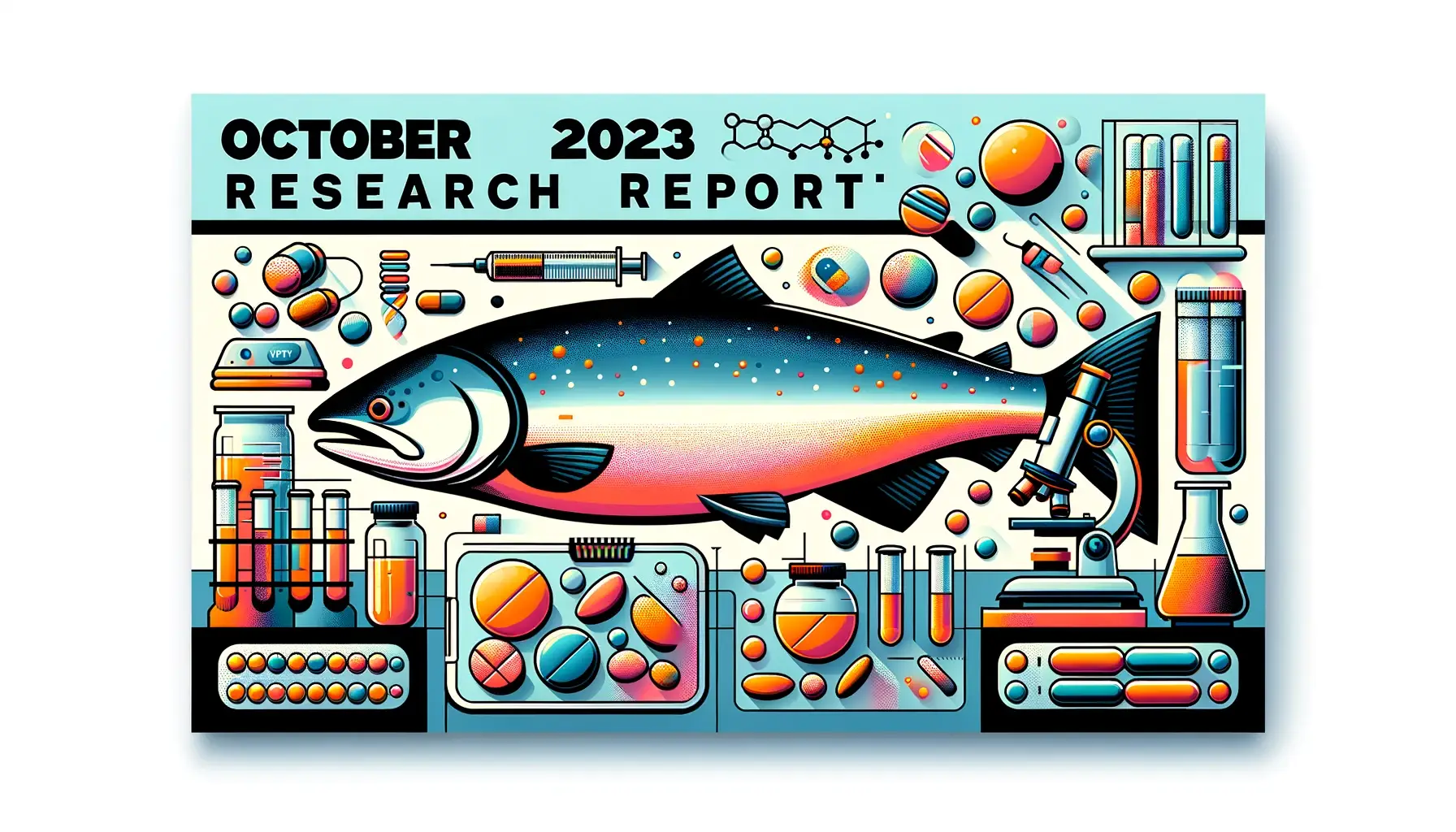Vitamin B12 Research: Top 5 Discoveries in October 2023

This blog post outlines the latest research on the benefits of Vitamin B12. From findings on its role in reducing obesity, its impact on cardiovascular diseases, the importance in our diet, and to its potential associations with food allergies and hypersensitivity, we will provide an overview of some of the fascinating new understandings being gained on this essential nutrient.
1. B12 and Obesity
Several studies indicate a potential link between Vitamin B12 levels and obesity. Understanding this connection could lead to new interventions for tackling obesity through diet and nutrition.
Higher Vitamin B12 Levels Linked to Reduced BMI and Body Fat [1]
A groundbreaking study recently explored the correlation between vitamin B12 levels and obesity. This complex relationship, impossible to decipher with traditional observational studies, was investigated using a bi-directional Mendelian randomization approach. This intriguing method allowed scientists to examine the two-way effect between these two factors, using genetics as a critical instrument in their research. The study used genetic variables related to vitamin B12 levels extracted from extensive genome-wide association studies. It then assessed five different aspects of body size and fat content across a person's lifespan and three different body compositions.
Findings revealed a remarkable link. Higher genetic likelihood of elevated vitamin B12 levels was robustly connected with lower body mass index (BMI). It was also associated with reduced body fat mass and a lower percentage of body fat. These findings were especially pronounced in female participants and at different body sites. This suggests a strong cause-and-effect relationship between vitamin B12 and body weight and composition. Importantly, the causative role appeared to flow in one direction - from vitamin B12 to body weight and not the other way round. This important discovery brings valuable insights for public health and nutrition interventions. It proposes vitamin B12 as a potential tool in combating obesity, hinting at the possibility of transforming dietary and nourishment strategies. Fascinating, isn't it? It goes on to show how vital it is to maintain a balanced diet, not just for our immediate satisfaction, but for long-term health benefits.
2. B12 and Cardiovascular Diseases
A strong correlation has been observed between Vitamin B12 levels and the risk of cardiovascular diseases, including ischemic stroke and heart failure. These insights could prompt early supplementation of B12, potentially aiding in the prevention of such diseases.
High Vitamin B12 Correlates with Increased Mortality Risk [2]
A recent systematic study has shown that high levels of Vitamin B12 in the body can elevate risk of all-cause mortality, especially among older adults. This study examined multiple existing studies and found a 4% higher risk of all-cause mortality for every 100 pmol/L increase in serum Vitamin B12 concentration in the general population. In older adults, the risk is even higher, at 6%. The research also indicates that individuals with levels of Vitamin B12 above 600 pmol/L have higher rates of all-cause and cardiovascular disease (CVD) mortality. Hence, it's crucial in clinical practice to timely identify and manage the primary cause of elevated serum Vitamin B12 concentrations.
Low Vitamin B12 Levels Increase Risk of Ischemic Stroke [3]
Another investigation studied the association between serum Vitamin B12 levels and the risk of ischemic stroke among hospitalized patients. It found that low Vitamin B12 levels may increase the risk of ischemic stroke. Patients with serum Vitamin B12 levels below 150 pg/mL and between 150-300 pg/mL were found to have increased prevalence of ischemic stroke. In contrast, patients with Vitamin B12 levels over 900 pg/mL showed a reduced prevalence of stroke. Therefore, early supplementation of Vitamin B12 could improve short-term prognosis for ischemic stroke patients.
Dietary Fat Intake Influences Cardiovascular and Metabolic Disorders [4]
Research was conducted to understand the relationship between intake of various nutrients and susceptibility to cardiovascular metabolic disorders, including heart failure, ischemic stroke, and Type 2 diabetes. The researchers found that an increase in dietary fat intake was associated with a reduced risk of heart failure. However, the study did not find a significant correlation between the consumption of other dietary elements such as Vitamin B12, and the risk of cardiovascular and metabolic disorders. This suggests that the consumption of dietary fat has a greater impact on susceptibility to heart failure than previously thought.
3. B12 in Our Diet
The amount of Vitamin B12 in our diet can greatly impact our health. For instance, its presence in fermented foods can contribute positively to our vitamin intake. This helps us draw a connection between diet, bacterial composition, and vitamin production.
Fermented Cereals Increase Vitamin B12 Levels [5]
In Ethiopia, fermented cereals like injera are commonly consumed, making them a good source of Vitamin B9 but not Vitamin B12, which is found only in animal origin foods. However, the bacteria responsible for fermenting such cereals may produce some Vitamin B12. Evidence from a study that examined injera from various Ethiopian households revealed mixed results. Cereal fermentation increased Vitamin B12 content in some households, while in others its levels dropped, but the cooking process consistently reduced the vitamin levels. Yet, injera contained roughly 2.1 μg/100 g of Vitamin B12, though the form of the vitamin was biologically inactive in humans. Interestingly, the link between the type of bacteria and the levels of Vitamin B12 suggests a promising direction: controlled fermentation using specific vitamin-producing bacteria could potentially enhance Vitamin B12 production in fermented foods.
Methyl Donor Diet Reduces Vascular Remodeling [6]
Dietary habits significantly affect cardiovascular disease development and progression. A recent study explored the impact of a 'methyl donor diet'—supplemented with nutrients such as Vitamin B12, folic acid, choline, betaine, and zinc—on intimal hyperplasia or abnormal growth in the innermost layer of arteries. Findings showed that rats on this diet exhibited decreased vessel wall stiffness and fibrosis due to vascular remodeling after carotid artery balloon injury. The methyl donor diet appeared to effect changes in the levels of proteins associated with vascular tonicity, potentially explaining this beneficial outcome. Therefore, nutrient supplementation focusing on 'methyl donors' like Vitamin B12 could help prevent injurious vascular remodeling.
4. B12 and Food Allergies
Early studies suggest a possible link between Vitamin B12 deficiency and children diagnosed with food allergies. Further exploration of this correlation could trigger preventative measures and provide a comprehensive understanding for the pediatric population.
Vitamin B12 Deficiency Linked to Food Allergies in Children [7]
Emerging evidence indicates a potential connection between Vitamin B12 deficiency and young children diagnosed with food allergies. A retrospective study examined hundreds of patients aged 0-36 months, and the findings illuminate a startling revelation: there's a higher prevalence of Vitamin B12 deficiency in children with food allergies compared to their healthy counterparts. More specifically, food-allergic children within the mentioned age range stand a higher risk of vitamin B12 deficiency.
Interestingly, the researchers found that formula feeding had a negative association with B12 deficiency, while having allergic diseases and breastfeeding for less than six months exhibited a positive association. Essentially, Formula-fed children showed higher levels of Vitamin B12, thus suggesting that formula feeding might provide a protective effect against B12 deficiency. Conversely, children who had allergic diseases or were breastfed for less than six months were more likely to have B12 deficiency.
These findings underscore the crucial role Vitamin B12 plays in the nutritional well-being of children, especially those with food allergies. It emphasizes the need for regular B12 level monitoring and the importance of timely interventions. The researchers behind this study call for further investigation to decipher the underlying mechanisms connecting food allergies and Vitamin B12 deficiency. This research could potentially pave the way for preventative measures and a more profound understanding of pediatric health, especially for children with food allergies.
5. B12 and Hypersensitivity
While rare, Vitamin B12 can trigger hypersensitivities in some individuals. Specific attention to this could form part of the evaluation protocol for patients showing hypersensitivity reactions and provide alternate solutions.
Vitamin B12 Hypersensitivity is Rare yet Manageable [8]
Investigations into Vitamin B12 related hypersensitivity (VB12H) suggest that while uncommon, this condition requires appropriate attention. A study focused on a group of individuals diagnosed with VB12H who sought help from three different allergy centers in the UK. The patients were subject to various tests, including a Vitamin B12 drug provocation test (DPT), administered either in the index form or as an alternative drug, depending upon the patient's skin test results. Interestingly, around 62% of patients exhibited immediate hypersensitivity to Vitamin B12, with some even experiencing anaphylaxis. However, they showed a positive response when subjected to skin tests with the index drug. Some others were able to tolerate the drug when subjected to DPT with an alternative form of Vitamin B12. Additionally, a unique case was reported where the patient reacted to polyethylene glycol present in oral cobalamin. Despite accounting for only a small percentage, those with delayed hypersensitivity reactions also managed to tolerate the intramuscular formulation of Vitamin B12. Based on these findings, a comprehensive evaluation protocol has been suggested. This includes conducting Vitamin B12 skin tests, taking into account potential allergies to polyethylene glycol, primarily in patients presenting with VB12H. While VB12H is rare, these findings help us comprehend its nature better and design more effective response strategies.
Conclusion
In conclusion, Vitamin B12 plays a crucial role in our health, contributing to several key functions in our bodies. The evolving understanding of its effects on obesity, cardiovascular diseases, diet, food allergies and hypersensitivity sheds light on its expansive impact on our well-being.
References
Fu, L., Cheng, H., Gao, L., Zhao, X., & Mi, J. (2023). Genetically proxied vitamin B12 and homocysteine in relation to life course adiposity and body composition. Diabetes & Metabolic Syndrome: Clinical Research & Reviews, 17(11), 102883. https://doi.org/https://doi.org/10.1016/j.dsx.2023.102883
Liu, K., Yang, Z., Lu, X., Zheng, B., Wu, S., Kang, J., Sun, S., & Zhao, J. (2024). The origin of vitamin B12 levels and risk of all-cause, cardiovascular and cancer specific mortality: A systematic review and dose-response meta-analysis. Archives of Gerontology and Geriatrics, 117, 105230. https://doi.org/https://doi.org/10.1016/j.archger.2023.105230
Zhou, L., Wang, J., Li, M., Tan, Y., Wu, Y., Song, X., Chen, X., Yan, T., Huang, J., & Yang, Q. (2023). Low vitamin B12 levels may predict the risk of ischemic stroke: A cross-sectional study. Journal of Clinical Neuroscience, 117, 125–135. https://doi.org/https://doi.org/10.1016/j.jocn.2023.09.024
yue Yue-Niu, Aierken, A., & Feng, L. (2024). Unraveling the link between dietary factors and cardiovascular metabolic diseases: Insights from a two-sample Mendelian Randomization investigation. Heart & Lung, 63, 72–77. https://doi.org/https://doi.org/10.1016/j.hrtlng.2023.09.012
Ashagrie, H., Baye, K., Guibert, B., Seyoum, Y., Rochette, I., & Humblot, C. (2023). Cereal-based fermented foods as a source of folate and cobalamin: The role of endogenous microbiota. Food Research International, 113625. https://doi.org/https://doi.org/10.1016/j.foodres.2023.113625
Jiang, Q.-L., Li, T., Xu, Q., Zeng, Y., Wang, W., Zhang, B.-T., Yao, Q.-P., Jiang, R., & Jiang, J. (2024). Methyl donor diet attenuates intimal hyperplasia after vascular injury in rats. The Journal of Nutritional Biochemistry, 123, 109486. https://doi.org/https://doi.org/10.1016/j.jnutbio.2023.109486
KILIÇ, B. O., KILIÇ, S., ÖZMERT, E., TAVARES, A., KONUKSEVER, D., KUBAT, G., & KÖKSAL, B. T. (2023). Evaluation of Vitamin B12 Values at the Time of Diagnosis in Children with Food Allergies Aged 0-36 Months. Nutrition, 112270. https://doi.org/https://doi.org/10.1016/j.nut.2023.112270
El Rhermoul, F.-Z., Mustafa, A., Wagner, A., Nakonechna, A., Kayode, O. S., Rutkowski, R., Siew, L. Q. C., & Rutkowski, K. (2023). Vitamin B12 hypersensitivity: a retrospective multicentre study. The Journal of Allergy and Clinical Immunology: In Practice. https://doi.org/https://doi.org/10.1016/j.jaip.2023.10.037
